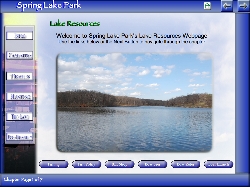IDT Students Design Spring Lake Website; New Site to Go Live This Summer
May 16, 2012

In Fall 2011, students enrolled in Western Illinois University Professor Bruce Harris' instructional design and technology 330 course created three computer-based learning modules that highlight Spring Lake Park's unique resources. According to Harris, the learning modules will be available sometime Summer 2012 on the Spring Lake Park website.
[Download Print-Quality Image]
MACOMB, IL -- A partnership between Macomb Park District staff at Spring Lake Park in Macomb and a class of Western Illinois University students enrolled in an instructional design and technology (IDT) course has turned out to be a win-win for the park and for the students. According to Bruce Harris, a professor in the IDT department at Western, in Fall 2011 his students enrolled in IDT 330 worked with Stan Abbot, superintendent of Spring Lake Park, to create three computer-based learning modules that highlight Spring Lake Park's unique resources.
The IDT 330 course focuses on the project management of instructional development projects, and the idea for the design of Harris' instruction—which would feature Spring Lake Park—in the course came about as a result of a sustainability workshop he participated in at Western in May 2011. The Coneflower Project, an initiative and annual workshop designed to infuse sustainability across the curriculum, is part of the Western's Institute of Environmental Studies.
"The idea came to me during the Coneflower Project workshop last year. The basic plan was to have the students in my IDT 330 course work on a project that integrated some aspect of environmental sustainability in the learning modules they develop," Harris said. "I had talked with Stan last summer after the workshop, and he mentioned to me that a major problem at Spring Lake Park is the large amount of trash people leave on the trails, in the lake and at the campsites. After our discussion, I thought it would a beneficial experience for my students to develop learning modules showcasing the resources available at Spring Lake Park and demonstrating how to protect and preserve these resources. The modules spotlight some of the primary natural resources available at Spring Lake Park, including the lake, camping sites and trails. The learning modules provided a way for me to integrate environmental sustainability issues into my curriculum using an experiential service-learning approach."
Harris added the students' work with Abbot provided them with the opportunity to apply their skills and knowledge to develop and manage the real-world projects. He said the goal of the IDT 330 course is for students to learn how to apply knowledge and principles of project management as they develop authentic instructional products for clients in the Macomb community.
Abbot, who is a WIU alumnus and also serves as an adjunct instructor for Western's recreation, park and tourism administration department, noted that working with the students in the IDT class was rewarding. He agreed it was beneficial not only for Spring Lake Park, but also for the students.
"After a little bit of discussion with the students and Bruce, we brainstormed and we decided to break into three different groups. Each group would take a specific entity at Spring Lake Park. Then, the students would put something together, send me what they produced and I would review it and fine tune it," Abbot explained. "It was fantastic working with the students, because they were so energetic, and they have the expertise with the multimedia-authoring program they used, which I don't. Also, with a small staff, I don't have the time in my job to do something like that. It was very good for the students, too, because, if they are going into this field, it demonstrated to them what they would have to go through with a client," he noted.
According to Rachel Presley, a senior IDT major from Meredosia, IL, working with Abbot and her group partners was "extremely important" to her learning experience.
"The most difficult part of the project was the scheduling to meet as a group outside of class. We compensated by phone, email and taking turns meeting with each other," she said. "Overall, the project taught me what to expect with a client, how to respond to the needs of the client, why it is important to keep in touch and that meeting the clients' needs is the essential reason for the design work on the project."
As a result of the partnership, Harris also noted that students will be able to use the learning modules in their electronic portfolios to provide evidence for prospective employers of the skills and expertise they acquired in project management.
According to Harris and Abbot, the learning modules will be available sometime this summer on the Spring Lake Park website at parks.macomb.com/spring.html.
For more information about the Spring Lake Park website project, contact Harris at B-Harris@wiu.edu. For more information about the Coneflower Project at WIU, visit www.wiu.edu/cas/ies/sustainability/.
Posted By: University Communications (U-Communications@wiu.edu)
Office of University Communications & Marketing

Connect with us: